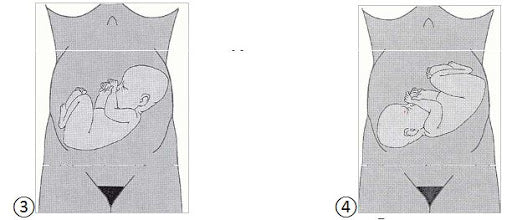
Between hormonal changes and changing your body, knowing how to sleep pregnant is essential for restful sleep.
Apart from the first trimester, in which all pregnant women are usually affected by an acute form of narcolepsy, sleep is much lighter.
At the physiological level, your body slowly gets used to the lack of sleep you will experience when you become a mother .
In the meantime, let's see some precautions to take to sleep well during pregnancy.
How to sleep pregnant with a good sleeping position?
Are you wondering which sleeping position while pregnant is the most comfortable and safest?
Here are advantages and disadvantages of the main:
Sleep on your stomach
You will see that this position will become increasingly uncomfortable and inconvenient, especially during the last trimester of pregnancy, when the belly will be huge.
The International Journal of Gynecology and Obstetrics published data from a University of Michigan study that sleeping on your stomach during pregnancy puts the fetus at risk of neonatal death .
The reason is that this position hinders the placental circulation of the uterus .
Sleep on your stomach makes you feel the full weight of the uterus on the diaphragm, give it back difficult breathing and can even lead to fainting.
Sleep on the left side (the optimal position!)
The best position for sleeping during pregnancy is on your left side with your legs bent .
Both sides are suitable for sleeping during pregnancy, but sleeping on the left offers additional benefits.
This side, the uterus does not weigh down the internal organs and the inferior vena cava , letting blood flow to the legs and back to the heart.
What is the vena cava? The vena cava is the largest blood vessel we have and our entire body's drainage passes through it.
It is divided into two vessels : the superior vena cava and inferior vena cava .
During pregnancy, it is valuable as it carries oxygen and nutrients to the fetus through the placenta.

The big advantage of this position?
Sleeping on the left side prevents the formation of water retention!
General tips for sleeping well during pregnancy
There are habits to get to know how to sleep pregnant:
- A pregnancy pillow
The nursing pillow is already very useful during pregnancy. When you lie down on the bed, stand on your left side and place it between your legs. In this way, it relieves back tension and fatigue accumulated during the day. You will see that in the ninth month, sleeping pregnant for two hours in a row will be a considerable feat without help!
- Reduce coffee
This is an easy way to find out how to sleep while pregnant. Try to avoid all stimulating drinks such as coffee, tea and carbonated drinks. They make your sleep restless and, above all, they can interfere with fetal growth.
- Drink little at night
It would be optimal if you could take in more fluids in the morning and early afternoon than in the evening. You will therefore be hydrated in the same way, but you run the risk of waking up with the urge to pee at night.
- Go to bed and wake up at fixed times
Waking up and going to bed at the same time always creates a positive habit for your body and for the brain, which will start sleeping at a fixed time more and more easily.
- Eat light in the evening
Fatty or fried foods are difficult to digest. Even more when you are pregnant. If eaten in the evening, they become a huge work for your stomach.
Prefer healthy foods. Your body and even your sleep will thank you!
- Walk a little before sleeping
A light walk helps digestion and clears the mind.
A panacea for a good night's sleep!
- Create an evening ritual
A hot shower or bath, a conversation with your husband, reading a good book, yoga or breathing techniques are relaxing activities that gently accompany you to bedtime.
Avoid technology in the evening, so as not to make it more difficult to fall asleep.
- Drink a relaxing herbal tea
Some plants are dangerous during pregnancy and it is best to stay away from them.

How to sleep while pregnant avoiding nighttime disturbances during pregnancy?
During the nine months of gestation, a few small nighttime disturbances could become common, especially in the third trimester.
Here is the list of main risks of nocturnal awakening:
- Waking up to pee
The bladder fills quickly. Results? Obviously, frequent awakenings to meet a primary need.
During pregnancy, the risk of urinary tract infections increases , so don't try to hold back hoping you'll fall asleep again.
- Waking up hungry!
If this happens to you, eat something dry like a cracker or a piece of bread .
Trying to resist is useless, except to make the hunger even stronger
- Waking up with nausea
Typical first trimester problem. Your hormones are in turmoil.
The trick? Keep some dry cookies or crackers on your bedside table to help limit the problem.
- wake up tired
Blood flow in the blood vessels and the high level of estrogen cause the nasal membranes to swell and make snoring common at night.
- Reflux and heartburn
Progesterone, a hormone essential to the smooth running of pregnancy, has the mission of relaxing the muscles to prevent uterine contractions. The other muscles are also involved in this process and thus, the valve which separates the esophagus from the stomach, opens more easily allowing the ascent of gastric juices.
To limit this phenomenon, try to eat small, frequent meals, so you never leave your stomach completely empty.
Do not eat oily, fried or greasy foods and have dinner early enough. Otherwise, you will need at least two to three hours before bedtime .
It can also help: sleep slightly with your head slightly elevated with two pillows under your back or even, towards the end of the pregnancy, sleep at half sitting if possible . Opt for memory foam cushions.
- Waking up with leg cramps
Waking up like this is really unpleasant and puts you in a bad mood.
What can you do?
Le magnesium is a good ally.
You can try to supplement it with nutrition by preferring dried fruits, broad leafy vegetables, legumes, bananas and potatoes or by taking a supplément. Usually it is present in specific supplements for pregnancy, because the fetus draws on the resources of the mother who therefore needs more quantities.
Make a stretching during the day and a little movement.
do not forget to to drink a lot of water, hydration of the body is essential.
- Restless legs syndrome
It's a neurological disorder in which you feel the urgent desire to continuously moving your legs . It clearly appears more frequently at night when the legs are still.
In this case, to know how to sleep pregnant, your best friends are folic acid and vitamin B12 .
Again, you can proceed to take a specific supplement and enrich your diet with particular foods.
Green leafy vegetables, artichokes, dried fruits, legumes and citrus fruits for folic acid .
La vitamin B12 on the other hand, is mainly present in foods of animal origin, for example: sardines, salmon, rabbit, cattle, eggs and cheeses.
- strange dreams
What to do? Talk to your husband over breakfast and burst out laughing.


























